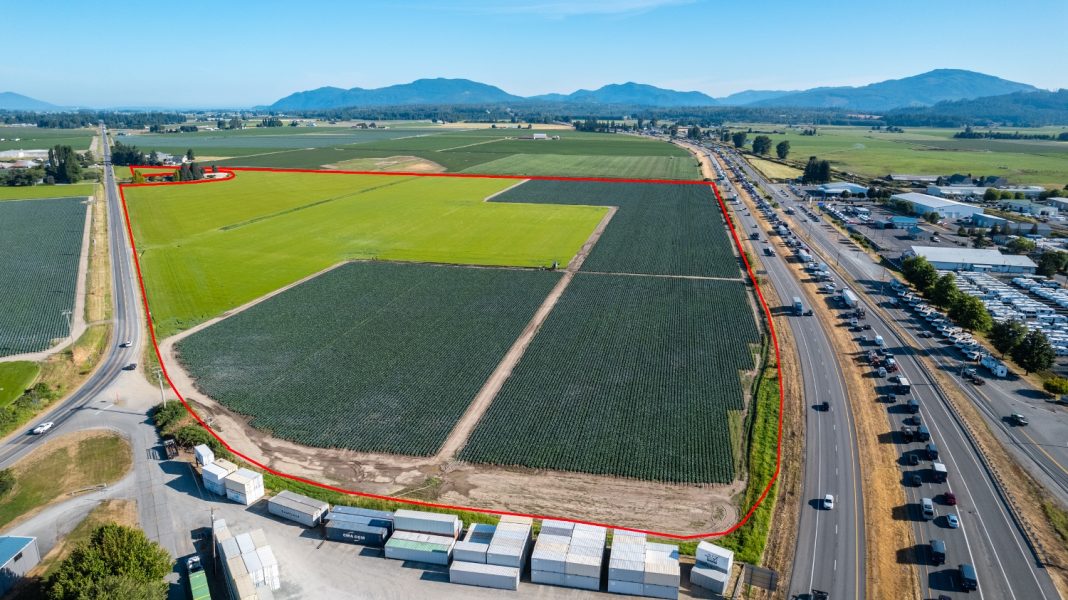For years, 80 acres of Skagit County farmland bordering Chuckanut Drive and Interstate 5 held the eye of developers. Mark Houser, who co-owns the land with his wife and children, received phone calls from those developers on a weekly basis. But now the phone has finally stopped ringing, thanks to Skagit County’s Farmland Legacy Program (FLP).
This summer, the program finalized a conservation easement on the property, permanently protecting it from non-agricultural use. For the last eight years, Skagit Valley Farm has leased the farmland – designated ‘prime’ by the United States Department of Agriculture – from the Houser family, utilizing its Skagit and Sumas silt loam soil to grow a rotation of potatoes and grains.
This land is also part of the county’s Agricultural Scenic Corridor, which has remained Washington State’s sole agricultural scenic highway since being officially designated in 2010. The several mile-long corridor showcases both historic and modern agricultural lands and their preservation.
The Value of Conservation in Skagit County
The Skagit FLP has protected nearly 15,000 acres of Skagit County land since 1997, and was established by the county’s board of commissioners to place conservation easements on farmland, indefinitely preventing non-agricultural development.
The program is voluntary for land owners, and uses a modest property tax levy to pay those land owners for giving up their property’s non-ag development rights. Since 1997, Skagit FLP has sourced $15 million in tax funds, as well as an additional $10 million in grants and nonprofit contributions.
Protected lands can be owned by families or individuals who no longer farm, but who keep their lands in production through short or long-term arrangements with community farms.
Sarah Stoner, agricultural lands coordinator for Skagit County, says Farmland Legacy reflects the values of both county commissioners and citizens who support protecting the fertile soils of their region. Farmland along Skagit’s I-5 corridor has long been especially vulnerable to development pressure, with the Houser property among the most highly visible from the highway.
In the late 1980s, a Whatcom County developer’s proposal to build a Knott’s Berry Farm-style amusement park just north of the Houser property spurred enormous outrage from the farming community, sparking conversations that paved the way for the current Skagit FLP.
Farmland Legacy Program: A Path to Protection
The process of protecting the Houser family’s acreage came with preliminary conversations between Skagit FLP and Mark Houser in early 2023.
“The 80 acres at the Chuckanut freeway Interchange stood out as farmland at high risk of being converted to use that has nothing to do with farming,” Stoner says. “Just take one look at what’s happened up and down the I-5 corridor, with numerous truck stops, warehouses, coffee shops, fast food and gas stations.”
From there, Skagit FLP staff contacted Skagitonians to Preserve Farmland (SPF), as the Houser property was in SPF’s priority area of high-pressure development along the I-5 corridor. What followed was the leveraging of public and private dollars between the two entities.
“Both of us working together is what brought this key project to the table,” Stoner says. “SPF and FLP are here to provide viable options as an alternative to the lucrative offers our farmers and farmland owners receive on the daily from developers.”
Farmland Legacy Program
Skagit County’s current commissioners see the preservation of the Houser’s 80 acres as another step towards better protecting the agriculture that helps keep the Skagit Valley brimming with agricultural and economic activity.
“Their decision is to the benefit of us all,” says Commissioner Ron Wesen, who represents the northwest district of Skagit County.
Looking ahead, the county has budgeted $3 million in conservation futures tax funds for the purchase of additional easements through the 2024-2025 biennium. It ensures that even more prime-soil farmland will stay in the hands of working farmers.
Stoner says the ability to officially safe-guard the Houser’s property from development is meaningful for a wide variety of Skagit County residents.
“It speaks to the strength of the voices that spoke up for the importance of Skagit agriculture nearly 30 years ago,” she says, “and the voices that continue to sing the song of agriculture here in the Skagit.”
For more information, visit the Skagit County’s Farmland Legacy Program website or call 360.416.1417.





































